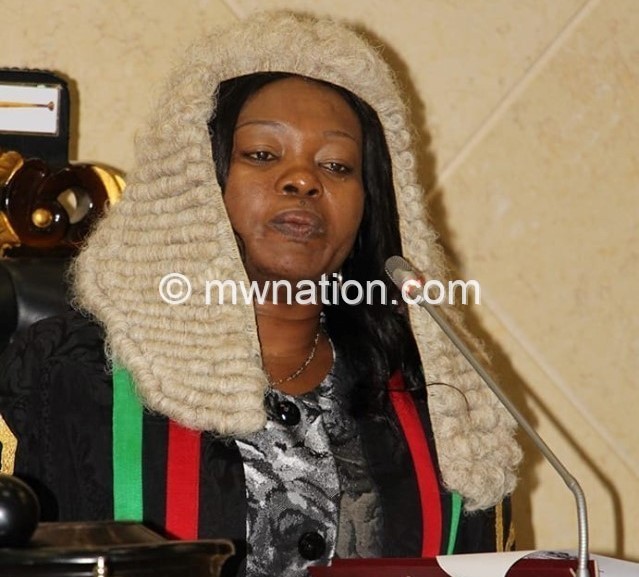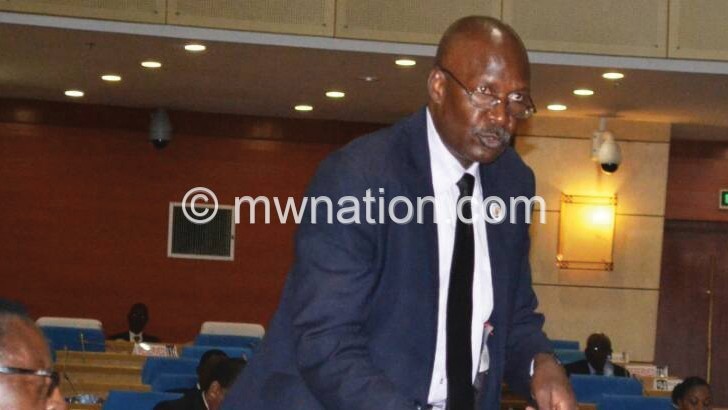MCP, DPP agree to elevate Speaker’s status
Both DPP and MCP are in synic with proposal to elevate the position of Speaker, a decision that UTM and UDF have vehemently opposed as something that can compromise the independence of the Legislature.
When the House adjourned last Friday, Leader of the House Kondwani Nankhumwa, in his adjournment statement proposed that the House should consider elevating the status of the office of the Speaker, which was below those in other Sadc countries.

The proposal comes on top of a Legal Affairs Committee report, adopted in the House in the last meeting, which also proposes that the office of the Speaker should be entitled to a package slightly below or equal to the VicePresident’s, and that they should enjoy retirement benefits like vice-presidents.
Weighing in on the leader of the House’s statement, in separate interviews with Nation on Sunday, UTM, People’s Party (PP) and United Democratic Front (UDF) rejected the proposal fearing that it may compromise the independence of the Speaker and the Legislature.
Malawi Congress Party (MCP), is an odd one out in the opposition camp as it seems to endorse the government–driven agenda.

According to Nankhumwa , in other Southern Africa Development Community (Sadc) countries, the Speaker’s office is more respected and is allowed to be assigned presidential functions.
Said Nankhumwa : “ Madam Speaker , Honourable Members you will agree with me that Speakers in Malawi do not enjoy the reputational status as that of Speakers in other Sadc countries and beyond. In other countries, the Speaker is respected even outside Parliament. In other countries, the Speaker is even called upon to act on behalf of the head of State in some other very important assignments.
“Madam Speaker, the point I am driving at is that as a nation, we must ascribe a higher status to the position of Speaker of Parliament than we are doing now. I am well aware that some of you would agree with me on this point while others would not agree. Whichever side of the fence one is, I believe this could be a debate worth pursuing”.

UTM spokesperson Joseph Chidanti-Malunga is suspicious of the government’s proposal, especially coming days after Nankhumwa accused the office of the Speaker of bias.
“I see no problem with the current status of the Speakership.
We cannot afford to be too luxurious when most people cannot put food on their table; when there is no medicine in hospitals; when children are learning under trees,” said Malunga, who equally quashed a suggestion to have the Speakership delegated presidential functions, saying such elevation would affect the independence of the Legislature.
PP, which in the last election worked with MCP, said they can only agree with the proposal to elevate the office of the Speaker if it means granting the Legislature, through the Speaker, some more autonomy than is the case now where the office plays second-fiddle to the Executive.
PPs spokesperson Ackson Kalaile Banda, who emphasised on granting the Legislature independence, rejected the idea of having the Speaker delegated presidential functions, calling it an act of interference. UDF, which largely has been in a working relationship with the Democratic Progressive Party (DPP), is equally opposed to Nankhumwa’s proposal.
The party’s publicist Ken Ndanga also agreed with PP that Parliament ought to be more independent than merely elevating the Speaker’s office for unclear reasons.
“In our view, the proposal is not clear about the gaps other than just elevation of status. The Constitution already gives the Vice-President those powers [to be delegated] and, therefore, we need to be clear as to what will become of the Vice-President? We need to interrogate the proposal. What we should be advocating is to make Parliament very independent so that it discharges its duties effectively,” said Ndanga.
In the just-ended sitting of Parliament, the House adopted a report from the Legal Affairs Committee on operational independence of the National Assembly.
One of the issues under consideration is to make Parliament financially independent so that it is not at the mercy of the Executive.
The report , however, also proposes an increased remuneration to the Speakership and that the welfare of the office must not be dependent on the President’s goodwill as is the case now.
In the submission, the committee cited cases from neighbouring countries such as Kenya where the Speaker enjoys near-presidential benefits.
“To reflect the fact that the Speaker is a head of an organ of the State [theoretically slightly below the level of the President as head of Government], the law should provide that the Speaker shall get a salary and such other benefits comparable to, but slightly below, those accruing to the Vice-President.
The Constitution may further provide that a Speaker, on vacating his/ her office on any ground, will get a retirement package comparable to the one that accrues to a retired Vice-President,” reads the report emanating from a motion moved by member for Ntchisi North and adopted by the committee in November 2018.
Commenting on the development, immediate-past Speaker Richard Msowoya said the office of the Speaker already has a higher status in line with the Constitution and that what must be done is simply to implement the law.
Msowoya said even in government protocol in public functions, the President is mentioned first, Vice-President second, then the Speaker comes third, meaning the Speakership is second in command from the presidency.
“The reason the presidency comes first is that they are elected by universal suffrage and the Speaker, although he/she is also elected, he/she is elected by representatives of the people in Parliament. So, as an elected position, the Speaker is believed to have the mandate of the people as well that is why he/she comes number two”.
While stressing that the Speakership is by design a higher office, Msowoya said during his time Parliament had deliberately embarked on a mission to make the Legislature more independent— through which, the higher status of the Speaker will be protected.
One of the proposals, according to Msowoya, is to have Parliament have its own legal representation than depending on the Attorney General, who is more inclined to serve the Executive at the expense of the Legislature in case of misunderstanding between the two organs.
On increased remuneration and having the Speaker handle presidential functions, the former lawmaker and Cabinet minister said this would be inappropriate as it defeats the spirit of separation of power.
“In terms of benefits, we must consider the economy. I know the Speakership elsewhere is well remunerated, but should we go by the South African standards? Definitely no, we need to live within our means,” he said.
But, in an interview after making a statement in Parliament, Nankhumwa insisted that resources can never be enough, adding that within the austerity mentality, government can do something.
MCP interim leader in the House Lobin Lowe agreed with Nankhumwa, saying the Speaker deserves elevation despite the lean resource envelope.
“The [office of the] Speaker deserves elevation. Resources are always limited, but should match status of other colleagues within Sadc,” he said.
Lowe’s sentiments agreed with Nankhumwa, who said in his statement, the proposal was not focusing on the incumbent Speaker.
On the question of representing the President on some functions, according to Lowe, the main opposition party has no problem so long these were not political functions. He added that what is problematic at the moment is that there seem to be no line between party and government functions.
With DPP and MCP speaking the same language, and if the proposal were to be presented in Parliament in form of a motion, it is likely to pass with ease given the numeric advantage of the two parties in the august House.
Chancellor College-based political analyst Mustafa Hussein said the Speaker does not deserve such elevation in view of the economic constraints.
“The public sector needs enormous resources for improvements in service delivery in education and health. Ideally, the President has to delegate to first Vice-president or Second Vice-President. The Speaker is the head of Legislature, a branch of government and the principle of separation of powers would be undermined with excessive interference by the President.





